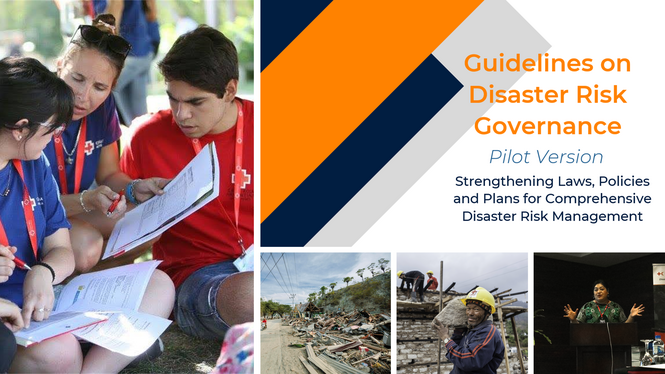
The new Guidelines build on IFRC Disaster Law’s existing research and recommendations on disaster risk reduction, preparedness and response, recovery, public health emergencies and international disaster assistance. They are designed to serve as a benchmark for assessing domestic laws, policies and plans.
The Guidelines also aim to provide guidance on the implementation of relevant international instruments, most notably the Sendai Framework and its priority of strengthening disaster risk governance. The release of the Guidelines is timely, with the recent Mid-Term Review of the Sendai Framework finding that progress towards strengthening disaster risk governance has been varied and that there is a continued need to enhance legal frameworks.
Isabelle Granger, IFRC Lead for Disaster Law and the Auxiliary Role, says the Guidelines adopt a holistic approach, identifying how many different types of instruments — laws, regulations, policies, plans and Standard Operating Procedures — can form a framework that supports effective disaster risk management.
“The Guidelines are a tool to support states in their efforts to strengthen disaster risk governance and become legally prepared for disasters and emergencies of all kinds. They can guide the development and review of domestic instruments, with the ultimate aim of keeping people safe from the impacts of disasters and climate change.”
In addition to addressing the core elements of disaster risk management —prevention and mitigation, preparedness, response and recovery — the Guidelines draw on IFRC Disaster Law’s research to address several cross-cutting issues such as disaster displacement and the protection of marginalised groups.
The Guidelines also highlight how the goals of disaster risk management and climate change adaptation overlap, outlining the practical implications of this overlap for domestic law and policy. They emphasise the need for disaster risk management activities to be designed to address the predicted evolution of climate change.
For each topic in the Guidelines, there is a description of key legal and practical issues. This is followed by a short checklist which identifies the types of legal, policy and planning provisions that need to be in place to support effective practical action.
IFRC welcomes comments on the pilot version of the Guidelines from disaster risk management experts and practitioners. Feedback can be provided via the online form or by email to rachel.macleod@ifrc.org. The Guidelines will be finalised in early 2024 and presented to the 34th International Conference of the Red Cross and Red Crescent in October 2024.